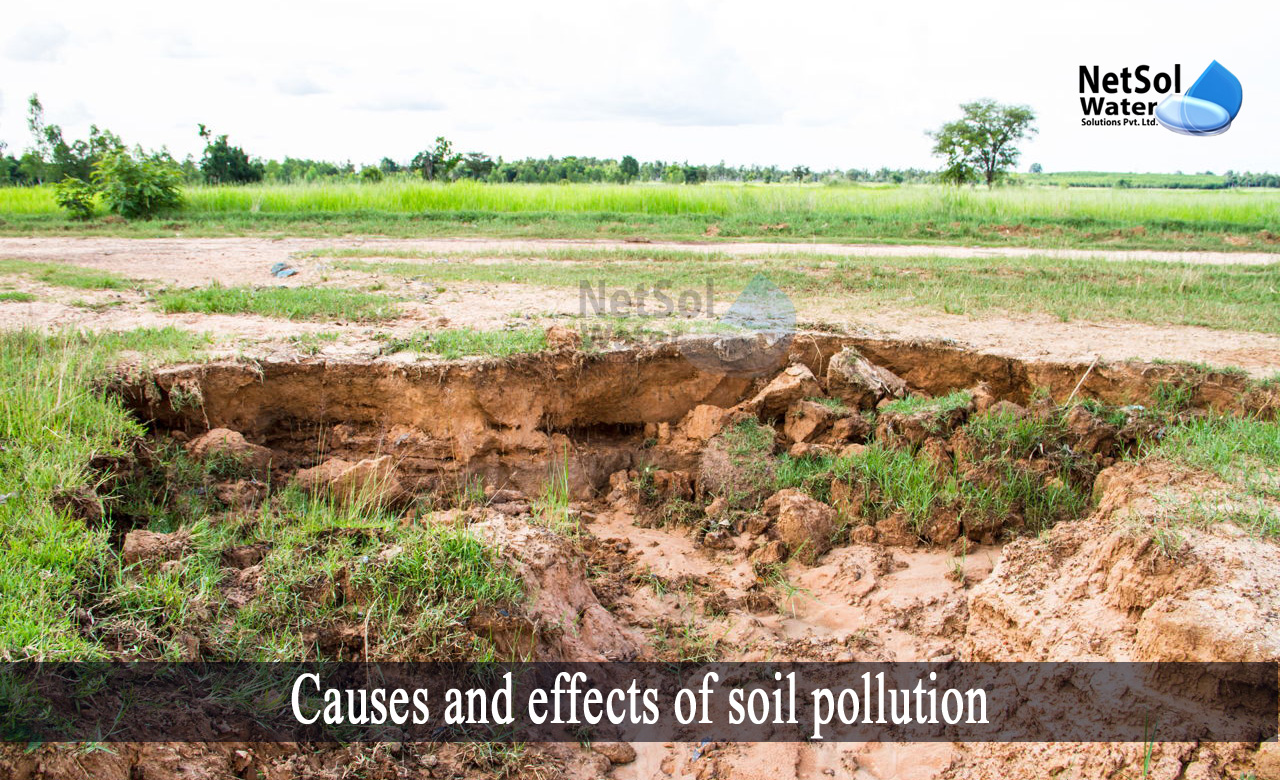What are the main Causes and effects of soil pollution?
The presence of man-made chemicals or other changes in the natural soil environment produces soil pollution. This type of contamination is typically caused by the failure of underground storage links, the application of pesticides, and the percolation of contaminated surface water into subsurface strata, the dumping of oil and fuel, the leaching of wastes from landfills, or the direct discharge of industrial wastes into the soil.
In this blog, we will mainly discuss about the causes and effects of soil pollution.
Main causes of soil pollution
· Indiscriminate fertilizer use
Vital nutrients, such as nitrogen, phosphorus, potassium, calcium, magnesium, sulphur, and others, must be received from the soil. Fertilizers are commonly used by farmers to remedy soil deficiencies.
Chemical fertilizers contaminate the soil with contaminants derived from the basic materials, used in their production.
· Pesticides, insecticides, and herbicides are used indiscriminately
Food-producing plants are under attack by insects, fungi, bacteria, viruses, rodents, and other animals, and must fight for nutrients with weeds. Farmers employ insecticides to eliminate unwanted populations that live in or on their crops.
· Large amounts of solid waste are dumped into soil
Solid waste, in general, encompasses waste, home refuse, and discarded solid materials, from commercial, industrial, and agricultural operations. They are increasingly made up of paper, cardboard, plastics, glass, out-dated construction material, packaging materials, and toxic or otherwise harmful substances.
Because, paper and food waste constitute a considerable portion of urban solid waste, the majority is recyclable or biodegradable in landfills. Similarly, the majority of agricultural waste is recycled, while mining debris is left on-site.
· Deforestation and soil erosion
When worn soil particles become loosened and moved away by wind or water, this is referred to as soil erosion. This erosion is exacerbated by deforestation, agricultural development, temperature extremes, precipitation, particularly acid rain, and human activities. Humans hasten this process by building, mining, cutting down trees, over-farming, and overgrazing.
Forests and grasslands are good soil binders, keeping the soil intact and healthy. They support several habitats and ecosystems, which in turn support numerous feeding channels or food chains for all species. Their extinction would endanger food chains and the existence of many species. Deforestation is gradually destroying the world's most productive flora and fauna habitats, which also represent enormous tracts of a very valuable CO2 sink.
· Pollution as a result of urbanization
Surface soil pollution from materials such as vegetables, animal wastes, papers, wooden pieces, carcasses, plant twigs, leaves, cloth wastes, and sweepings, as well as many non-biodegradable materials, such as plastic bags, bottles, glass bottles, pieces, stone/cement pieces.
If they are not collected and degraded, they can create a variety of issues, including:
· Drain clogging: This causes major drainage issues, such as burst or leaky drainage pipes, which can lead to health risks.
· Water movement impediment: Solid wastes substantially hampered normal water movement, causing floods, foundation damage, and public health hazards.
· Unpleasant odour: It is caused by dumping wastes.
· Increased microbial activity: Microbial decomposition of organic wastes produces enormous amounts of methane, as well as several compounds that damage the soil and water flowing on its surface.
Effects of soil pollution
1: Agricultural
- Decreased soil fertility
- Nitrogen-fixing is reduced
- Erodibility is increased
- Increased soil and nutrient loss
- Silt deposition in tanks and reservoirs
- Crop yield reduction
- Inadequate soil fauna and flora
2: Industrial
- Dangerous substances make their way into underground water
- Un-balance in the environment
- Pollutant gas emissions
- The release of radioactive rays causing health issues
- Salinity is increased
- Vegetation loss
3: Urban
- Drainage clogging
- Flooding of areas
- Public health issues
- Sources of drinking water pollution
- Gaseous emissions and foul odour
- Problems with waste management
4: Environmental
- Food-growing soil becomes scarce
- When contaminated soil is utilized to grow food, the yields are usually lower
- Pollutants alter the soil's composition and the types of microorganisms that reside in it. As a result soil pollution has the potential to alter entire ecosystems.
Conclusion
As part of the growing environmental concerns to manage, minimize, and battle soil pollution, and the environmental problems connected with soil pollutants, the globe is now heavily focused on the prevention of soil pollution. Therefore, we need effective solutions.
How can we assist?
To protect our environment, we offer a variety of modern solutions such as solid waste management, wastewater treatment, sewage treatment, water treatment, etc. For this purpose, we manufacture a variety of water treatment plants, wastewater treatment plants, effluent treatment plants, solid waste recyclers, green waste recyclers, etc.
Netsol Water is Greater Noida-based leading water & wastewater treatment plant manufacturer. We are industry's most demanding company based on client review and work quality. We are known as best commercial RO plant manufacturers, industrial RO plant manufacturer, sewage treatment plant manufacturer, Water Softener Plant Manufacturers and effluent treatment plant manufacturers. Apart from this 24x7 customer support is our USP. Call on +91-9650608473, or write us at enquiry@netsolwater.com for any support, inquiry or product-purchase related query.



